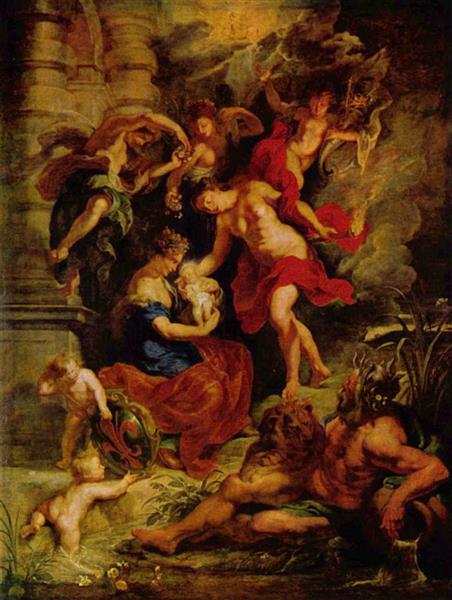תיאור
Peter Paul Rubens's The Birth of the Princess, created in 1625, is a captivating testament to the painter's mastery of Baroque painting, an era characterized by its dynamism, dramatic use of light and shadow, and ability to communicate intense emotion. This piece not only illustrates Rubens' vision of motherhood and nobility, but also reflects his interest in allegory and the exaltation of royalty through a visual narrative rich in symbolism.
In this painting, Rubens reveals his mastery of composition, creating a fluid movement that guides the viewer's gaze through the scene. The focus towards the center, where the princess's mother is presented surrounded by a series of figures, establishes an obvious focal point that emanates warmth and closeness. The figures are arranged in such a way that they form an arc that encapsulates the action and emotion of the moment, reflecting Rubens' humanistic character that celebrates life and family joy.
Colour plays a fundamental role in the emotional force of this work. Rubens makes use of a rich and warm palette, predominantly gold, crimson and earth tones, which not only add a sense of opulence but also create a welcoming atmosphere. The light delicately illuminates the figures, highlighting the mother's flushed skin which, while reflecting her efforts, radiates an aura of happiness and satisfaction. This play between light and shadow not only emphasises the three-dimensionality of the figures, but also contributes to the creation of an intimate and almost heavenly setting.
The characters surrounding the mother are equally significant. Each has their own role to complete in this visual narrative, ranging from the domestic to the ceremonial. The expressions on their faces, from joy to reverence, are combined with gestures that underline the importance of the act of giving birth, emphasizing both the physical and emotional approach to this event. Rubens, known for his ability to depict the human figure with great realism and sensitivity, also strives to capture the essence of each character in his work, enriching the story that unfolds before us.
It is interesting to note that throughout his career, Rubens often addressed themes related to motherhood and fertility, which can be seen as a manifestation of the values of his time, where procreation and the consolidation of alliances through marriage were fundamental to the nobility. The work not only reflects the individuality of the time, but also fits into a tradition that explores the complexities of lineage and family glory.
In conclusion, The Birth of the Princess is more than just a depiction of a moment in life; it is emblematic of Rubens' ability to fuse technique, color, and narrative into a work that not only pays homage to motherhood, but also to the grandeur of nobility. His dynamic approach and ability to capture the essence of life can be seen as defining traits that continue to resonate in contemporary art, reminding us of the enduring influence of his work and his commitment to exploring the human experience.
KUADROS ©, a famous painting on your wall.
Hand-made oil painting reproductions, with the quality of professional artists and the distinctive seal of KUADROS ©.
Painting reproduction service with satisfaction guarantee. If you are not completely satisfied with the replica of your painting, we will refund 100% of your money.

